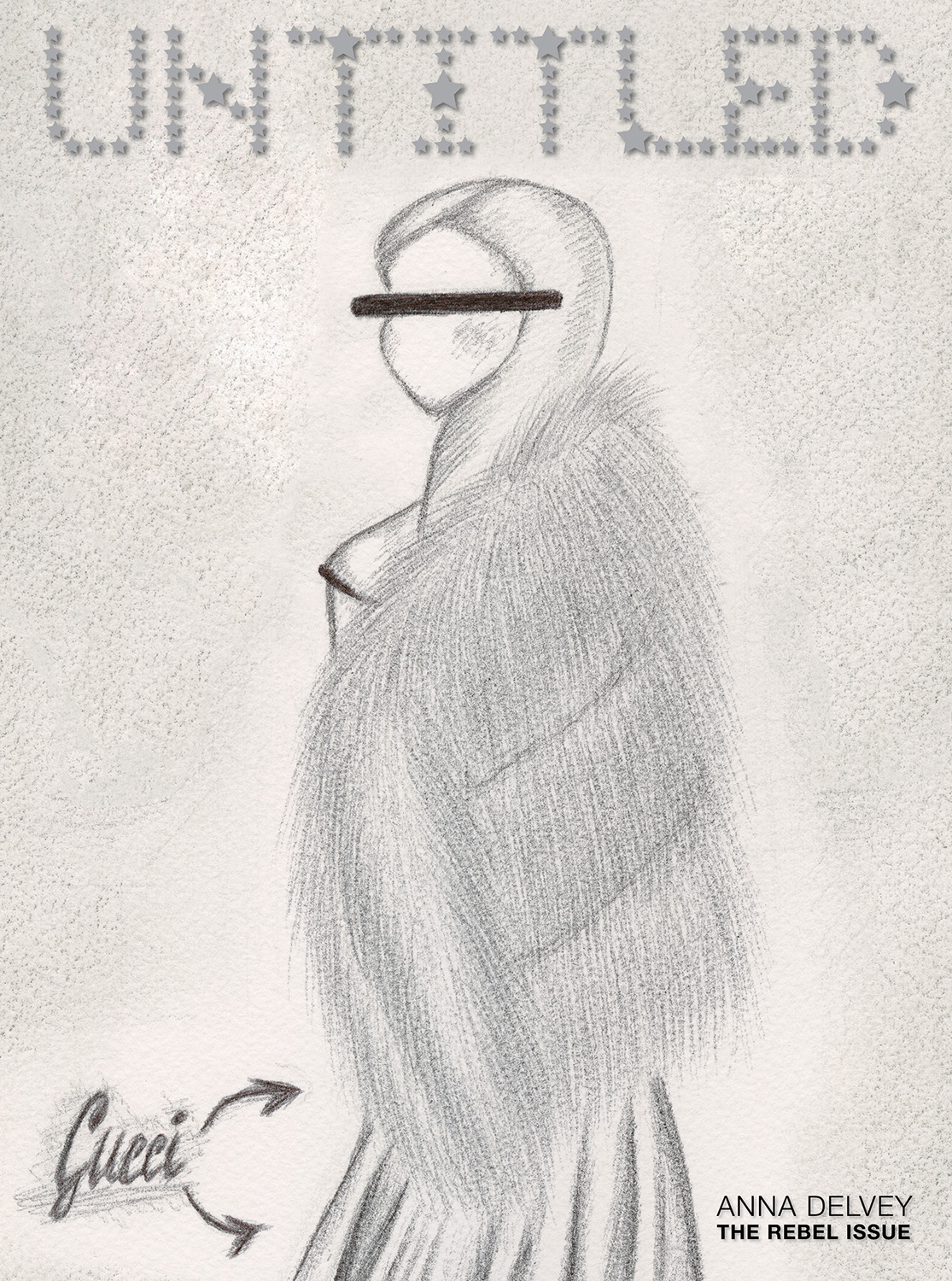
INTERVIEW BY INDIRA CESARINE
“Not guilty.” Those two simple words, accompanied by “Anna Delvey,” adorn one of the infamous socialite’s latest artworks, scrawled in color pencil repeatedly on a single piece of paper. Anna Delvey, whose birth name is Anna Sorokin, released the artwork as a means of “reclaiming her narrative” in order to tell her story from her own perspective.
Russian-born and German-raised Anna Sorokin, daughter of a truck driver and a convenience store owner, made a name for herself in the mid-2010s off a false rumor that deemed her a German heiress. As the popular media story goes, she infiltrated the upper echelons of New York City’s art and social scenes, often by having others pay for exorbitant hotel rooms, international flights, and other steep expenses. It all came to a head in May 2017 when Sorokin – better known by then as Delvey – invited friend and Vanity Fair editor Rachel DeLoache Williams, along with her videographer and personal trainer, on an “all-expenses paid” vacation to Morocco at the 5-star resort La Mamounia. Delvey convinced Williams to front the hotel bill after failing to pay it herself, in addition to a number of other charges for the trip. When Williams later received only partial reimbursement from Delvey, she helped facilitate the NYPD sting operation that led to Delvey’s conviction and imprisonment.
Despite her sentence of four to 12 years, Delvey was released after only a few years in prison for good behavior. Six short weeks of freedom later, ICE detained her over her expired visa. This time, incarceration was closely followed by an international rise to household name status, due in no small part to Inventing Anna, the three-time Emmy-nominated Netflix miniseries that told the Anna Delvey story as it was recalled in journalist Jessica Pressler’s viral article in The Cut. Williams also published My Friend Anna, an entire book on her time with Delvey that only furthered her story’s outlandish mythos.
Though still detained by ICE (U.S. Immigration and Customs Enforcement) and fighting a case against her deportation to Germany when she spoke to Indira Cesarine for The Untitled Magazine’s REBEL Issue in late August, Delvey was not entirely in a bubble. The communication she was afforded with the outside world was limited, but her team would post on social media on her behalf, and she could read the news on a limited-access prison-issued computer tablet. She sees much of her history as a series of mistakes rather than the calculated set of fraudulent heists depicted in the media, but she’s no longer looking at the past. To Delvey, it’s the present day that’s critical for setting the record straight – a task she hopes to accomplish through her longtime passion for art.
Though supplies at the ICE detention center were certainly at a premium (no paper larger than nine by 12 was permitted), Delvey saw her work through “from idea to execution.” She created her original artwork as well as limited-edition prints using assorted scraps, like smuggled watercolor paper and a set of pens and colored pencils. It was with these meager materials that she created her artwork “No Regrets” for our “REBEL Issue” and Exhibition. While in detainment she had limited access to the phone, and with calls only allowed for up to 20 minutes increments at a time, she told her side of the story to editor-in-chief Indira Cesarine over several choppy calls from the detainment center phone lines prior to her release on October 5th, 2022.
Although now under house arrest, with restrictions including electronic monitoring and no access to social media, her latest artwork was shipped prior to her release and is on view at The Untitled Space gallery in Tribeca through the month of October 2022. Read on for our full interview with Anna Sorokin aka Anna Delvey, and for more information on The REBEL Exhibition visit untitled-space.com.
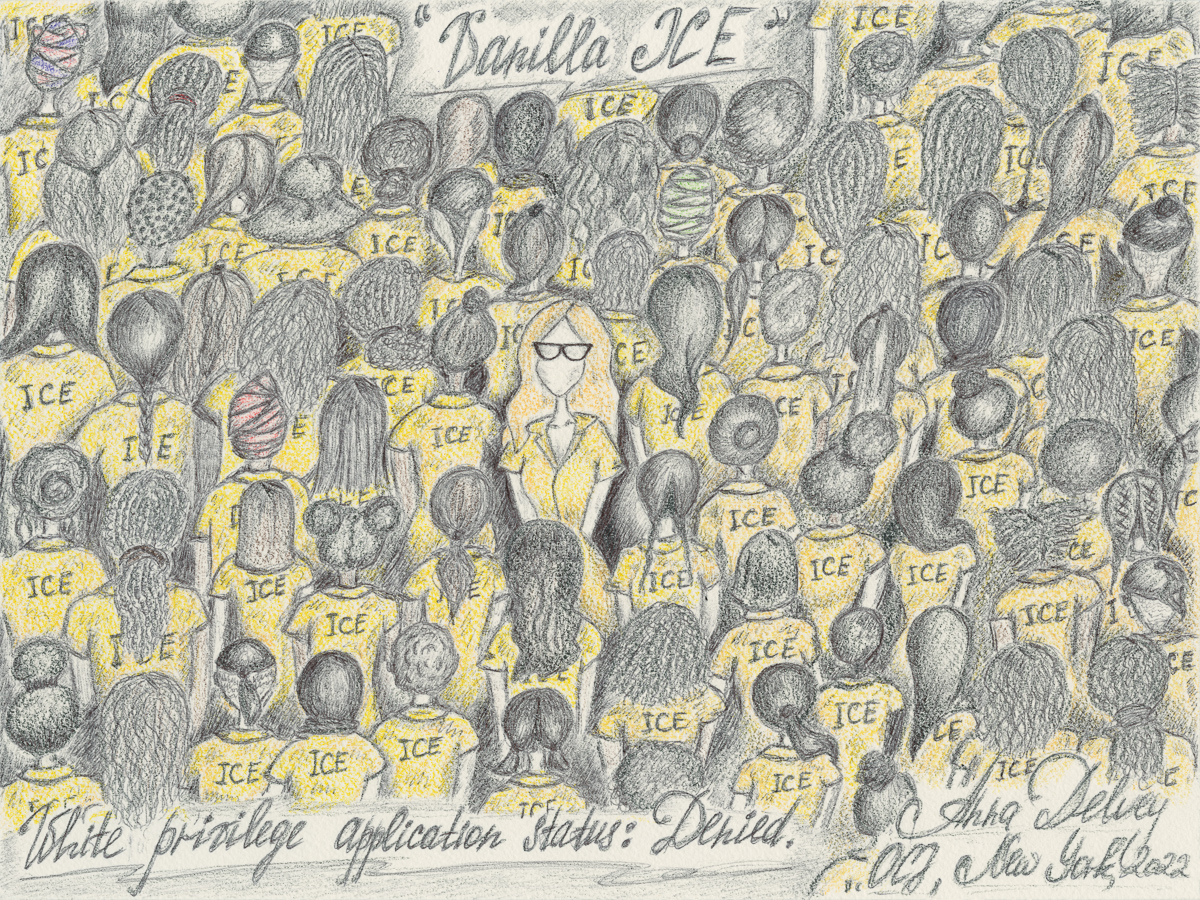
Indira Cesarine: I’d love to chat about your current situation in ICE detainment. What’s your day-to-day like at the moment?
Anna Delvey: I’m constantly figuring things out. There’s a new obstacle every day, but I have a tablet with a phone/messaging app and news apps, so that helps a lot. I have some WiFi, even though it’s limited, so I’m just on it all day. I go for two or three tablets; I have to purchase new charge tablets from inmates who don’t use theirs. I hopefully will be out of here very soon. I have a new legal team, and they are working on getting me out.
I understand you were only free for six weeks before you were detained by ICE. Did you know that that would happen? What led up to having to go back to jail right after being released?
Well, I always knew that was a possibility, but the issue with immigration is just that they have so much discretion. It’s totally different from criminal law, where there are judges and prosecution, and you can’t do whatever you wish, which seems to be the case with ICE and the DHS. They don’t really have to deport anybody. For example, if you kill somebody, they have to prosecute you, but that’s not how it is with immigration. They have so many people who have a final deportation order, and they just don’t bother with them. They never really gave a reason. ICE used to come and see me while I was approaching the end of my sentence, and at the end, an officer said, “You overstayed your visa,” and I’m like, “Yeah, that’s not a secret.” And then, two or three days before I was released on the 11th, they came and said, “We don’t want you anymore. You’re not a priority.” So they paroled me on ICE supervision. I went to report on March 25th, and that’s when they arrested me, and they don’t really have to give you any reasons. I did not violate any of my conditions, which were to not leave the state and to report to them. I didn’t violate any of that, but they have the power to detain me. Everybody was anxious, of course, because of my social media, and they used that against me during my bond hearing. So I don’t have it in writing, but that’s pretty much what it seems to be.
Do you have access to social media now?
No, I’m posting through the people on my team. They have access to my socials, but I don’t have access to anything here.
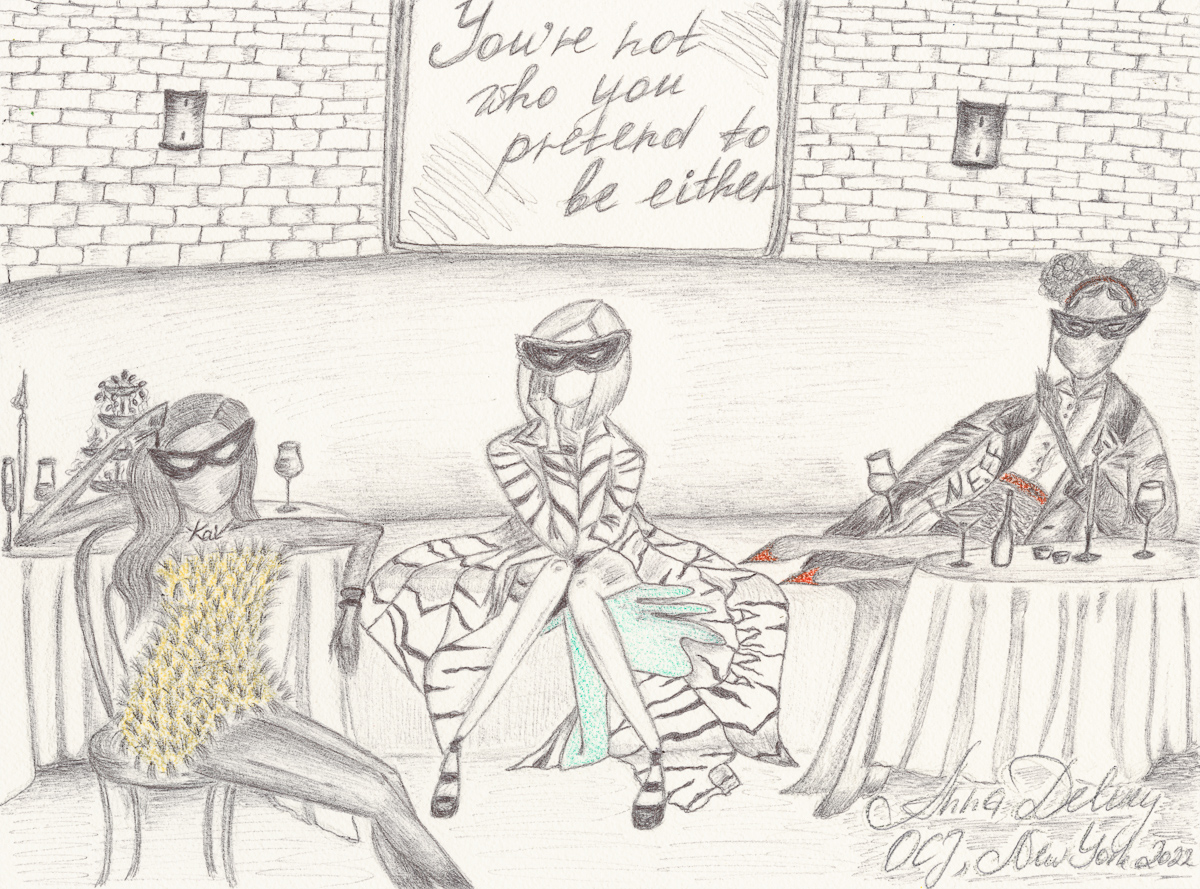
I’m sure that you’ve heard a lot about how Inventing Anna has been nominated for several Emmys. How do you feel about how you were portrayed in the series? Do you think it was accurate?
I actually have not seen the series because I was in here the whole time. I only saw different pieces with friends and journalists over the media app, but I have not watched the complete series. I take it for what it is: A dramatized version of the story. It’s entertainment, so I’m not taking it too personally. I feel like I had everything and nothing to do with it. Everybody says Julia [Garner] did a great job. Good friends of mine tell me she had me spot on.
You’ve been making a lot of incredible artwork from prison, which has been getting a lot of buzz. I’d love to talk about this new direction that you’re taking and some of the themes that you’re addressing with your work. I understand that you’re trying to use artwork as a means of controlling your narrative. Can you tell me about how you want to reclaim your narrative and re-position yourself through your artwork?
When people say “control the narrative,” I’m not trying to do it by a model. Obviously, it’s not just saying, “You are wrong about this, and this is how it happened.” I’m not trying to go about it that way. I’m trying to give people a chance to see how my life works and my way of thinking, and that’s what provides me with a better understanding of how to put my foot down, as opposed to just sitting down. Taking apart the Netflix series, saying what’s wrong and what’s right, it’s just kind of more generalized – how I perceive the things that happened to me in that global probation and whatever happened in the past.

I saw that recently, you released an artwork that just has “Anna Delvey” “Not Guilty” repeated in script. What is the meaning behind releasing an artwork that says “not guilty?”
Well, I think it’s a little bit sarcastic like the rest of my work. I feel like I’m not guilty of the narrative the prosecution put out there. The story has been somewhat set straight – when I went to trial – but I think I was able to prove them wrong. Not everything that they said was necessarily true just because the media put out that press release. Not everything there was true. I feel I’m not guilty of the crimes the media charged me with. Let’s put it that way.
What do you feel was not fair?
Well, I never had the intention to commit fraud. If you understand fraud of people, the definition is that you criminally deprived somebody of money or things. Nobody in the world can tell me what my intentions were. I know the way I was hoping for it to come out, and it just didn’t happen that way. I did something wrong, but it doesn’t make me universally, a hundred percent an awful person.
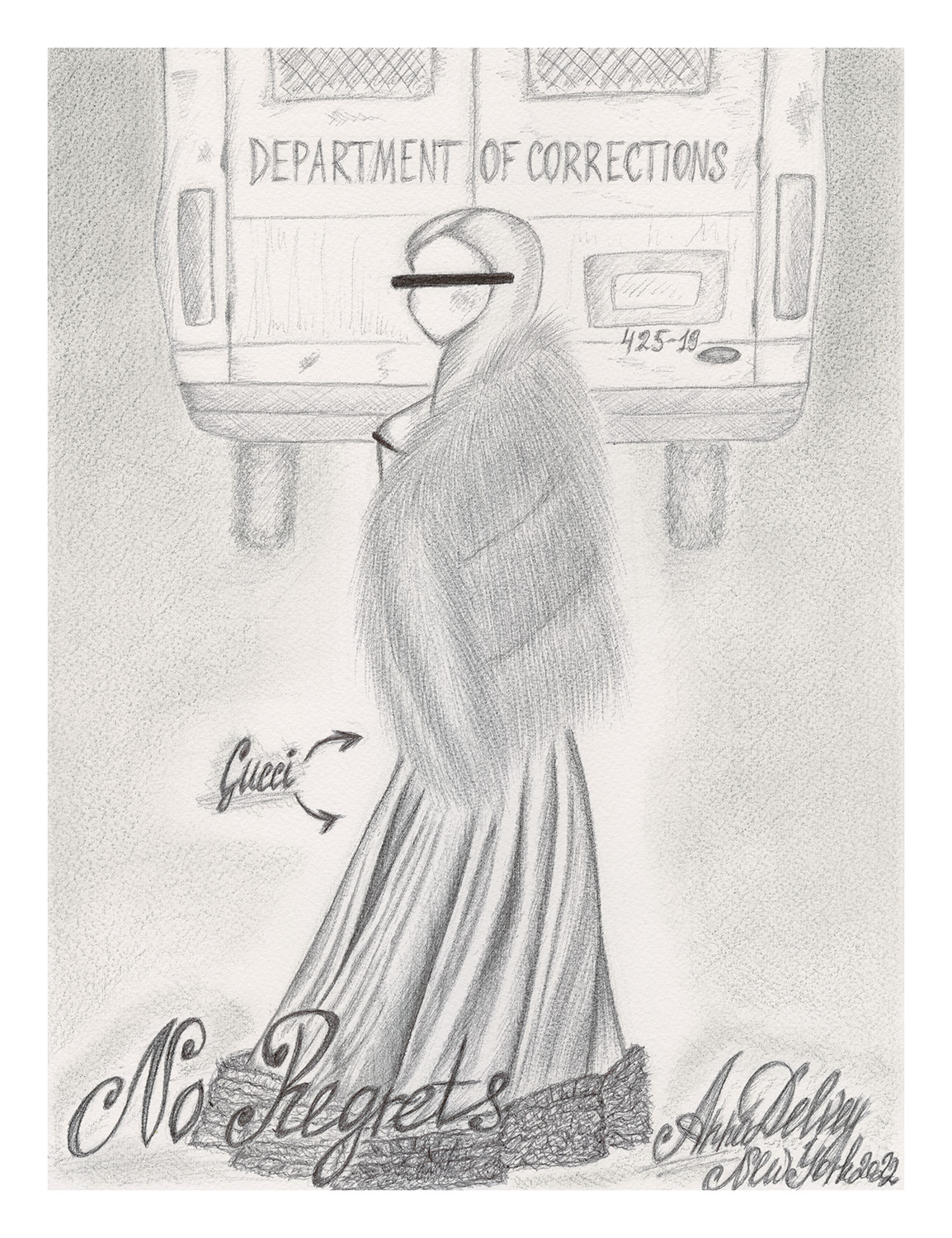
I’m sure there are a lot of things that have been exaggerated and misconstrued. Reality is always very different from the ways people position things, particularly in the media. I’d love to talk more about your artwork because we’re very excited to have an original piece by you featured in The REBEL Issue and in our coinciding exhibit. Can you tell me about the artwork that you made for our new issue?
Of course. The artwork captures “No Regrets” because it is a rebel issue. It has this girl who is looking back as she’s walking away, and she’s wearing a Gucci outfit. In the background is the Department of Correction. I guess that the work is about just making the best out of the situation that you’ve been presented with and working from it, and trying to learn from your mistakes and not being stuck in the past. It’s about trying to change and redemption, in a way. Society just needs to be more forgiving of people that make mistakes.
I can hear in your voice that you seem very happy when you talk about your artwork, which has very playful, provocative titles and themes. What role does humor play in your work?
I think it’s my way of dealing with things. It’s just how I process information and everything that happens to me. I can’t help but look at things that way, and the problem is that, sometimes, it doesn’t always translate well in print or in the courtroom during hearings. There’s always different sides to things; there are very few things that are just good or just bad. So when you try to make fun of something that’s been perceived as negative, humor is a different way of looking at it.
A bit of comic relief is always a good way of handling things that are perhaps too serious to deal with otherwise.
Yeah, and it definitely doesn’t always mean that I’m not taking things seriously. I don’t want people to portray me as flippant or careless because that’s not the place I was coming from.
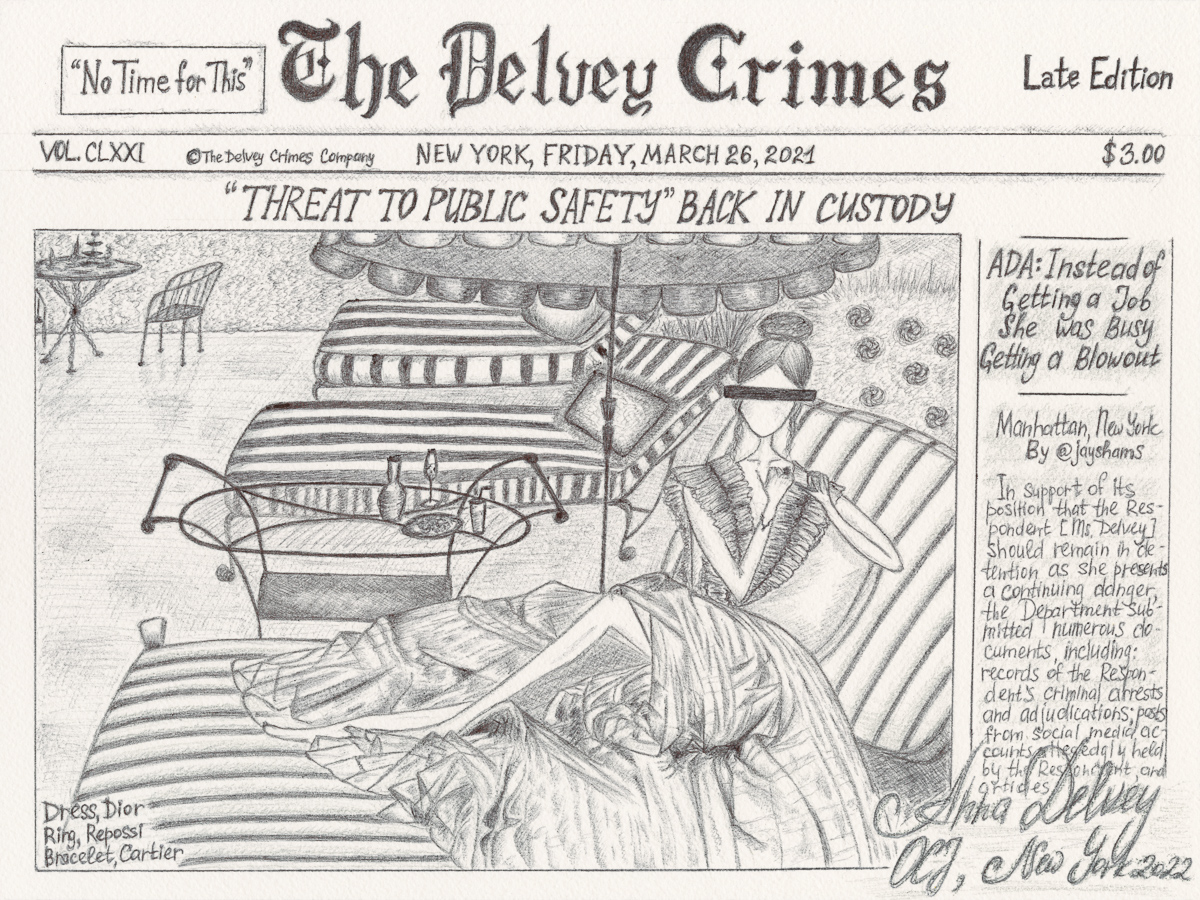
I would imagine that making your artwork has become a kind of therapy for you while you’re in prison?
Definitely. And it’s not as in-your-face as it would’ve been with something else, like writing a book or another method of expression. In an ideal world, all the projects that I’ll be doing in the future will adapt to a bigger picture. And I know that the bigger picture will portray a more accurate version of me than the one that was created by the media.
At one stage, you were collaborating with another artist, Alfredo, to make your artwork, and I also read that you have been making the artwork on smuggled watercolor paper. How are you making these pieces in detainment? Are you making them personally? Is somebody else making them for you? What is the process?
I’m making everything myself. The only pieces that Alfredo has done [were] for the very first show in March. The reason he did that is because I was unable to get any bigger-size paper in here. The paper I have here, it’s nine by 12 because we are not allowed to have anything that’s larger than that. I have 10 pens and pencils, and I do everything from the idea to the execution.
I also wanted to ask about your solo exhibit, Allegedly, which was a one-night show in a nightclub at the PUBLIC Hotel. Why did you decide to do that instead of doing a gallery exhibit?
It was a collaborative effort, so we brainstormed with everybody and decided to do something different. We thought doing it in a hotel would be an interesting connection because of my backstory.
How do you feel about how it was received? It definitely got some negative reviews, which were very focused on the presentation. They also said it was a stunt.
I can’t really plan it myself because it’s really hard for me to communicate anything visual from here; I cannot send videos or pictures. So I felt it was outside of my control. I was hoping people would understand that there’s only so much control I can have over things, and that I’m trying to move on from this caricature version of myself. It was pretty much somebody else’s vision of me with my artwork [in it]. If I was there myself, I probably would’ve done things differently.

Once you’re released, I’m assuming you’re going to continue with your artwork. Do you feel that you want people to take your artwork and your art career more seriously and professionally? Or is this something that you think you’re doing while you’re in prison just to pass the time?
I’m definitely going to continue if, in one form or another, it’s a way for me to be seen. It’s definitely a form of expression that I like a lot – I always have. I was always working in the art world in some way, shape, or form, like when I was interning for an art magazine, or when I was trying to do my art foundation. I’ll definitely continue to pursue it. There’s just so much material, and the opportunity always presents itself. I have 20 pages with ideas for what I can draw next. So there’s never a shortage of material for me. And this is kind of what keeps this thing going because I never have to sit down and wrack my brain over what I’m going to do. The ideas come first.
A lot of your artwork places an emphasis on fashion. Does fashion still matter to you that much after having spent time in prison?
I think I interact with it in a different way now that I can’t try it and can only look at it. I feel closer to it because it’s how I learned to draw. I took this fashion illustration course in Paris, and it’s a big part of my sketches. Fashion is a form of communication. It’s a form of self-expression, and I definitely can’t wait until I can actually wear things and not just draw them.

It must get boring wearing the prison uniform?
Yeah, I won’t miss that part. Something feels scary about it. If you see how many people have to wear a uniform on a daily basis, and people who work for airlines and the government, plenty of people don’t get to choose what they wear – at least for work.
Let’s talk about your NFT launch. You launched your own NFT collection, which you called Reinventing Anna. Can you tell me about the NFTs?
It’s actually a project that we are working on right now. We’ll have more information in the next couple weeks. I don’t want to reveal too much ‘cause we are ironing out the last details. We launched the first part of it in March, but that was just the very beginning. I’ve made bigger changes, and it will accomplish more things, as opposed to just providing access to me. It will be bigger in scope.
Your NFTs offered access to phone calls and meetings with you. Why did you decide to offer these personal, intimate opportunities as opposed to selling artwork?
I think, when people hear “NFT,” they automatically think about the pictures that they sold for billions of dollars. That’s really not all there is to NFTs. I’m really excited about blockchain technology and what can be done with it. I feel access is the next thing, and NFTs are not being seen as an investment. It’s just another form of NFT, so I didn’t wanna go out there and sell a sketch of mine for $5 billion because that’s not what it’s all about. There was a more interesting opportunity, and you can do so much with NFTs that isn’t out there already. The big part of the drop is happening in October. I will definitely incorporate the ICE component in there.
The whole “Anna access” thing, obviously, is something that I would imagine would be difficult to do while you’re incarcerated. Will those be rolled out after you’re released?
Hopefully. We actually did a Discord, so we’ve done several of the things, and we’re trying to figure out what works. The token, and the way it’s structured now, is tokenized access to the Discord community. I called in and spoke to people on open chat – to people who had tokens. We are just trying to figure out what’s best for everybody because everything’s pretty new, and there are not really that many credit centers.
Do you have access to your Discord community from ICE?
No, but my team does. Everything’s about team effort, so my people organized everything from here, and I called in, like how I’m talking to you right now. I had a co-host, and they gave [me] questions from the audience.
Do you feel you’ve learned a lot since you’ve been in prison?
Of course, yes. It’s just a totally different environment from what I’ve been used to. It’s all kinds of people from all walks of life, and it was definitely a very enriching experience, culturally. It’s a social experiment in a way, being in jail with people.
You’ve said that you realized you were really sheltered prior to going in. Was it very eye-opening? Did you meet anybody that you actually connected with since you’ve been in there? How has the overall experience been?
I met a lot of people I feel connected with, and I think I know more than what I knew at 25. I felt like I had traveled the world and met all kinds of people, but I didn’t really feel anything there because it was all the same kinds of people, in the end. But here, it’s crazy to hear people’s stories. I used to think my story was crazy, but some of theirs are even more interesting. I’ve been at Rikers, I’ve been at another jail, I’ve been here, and I kept in touch with a lot of people. They reach out to me on social media. To see the system play itself out, not just on me, but on everybody else, that’s been interesting too. It’s one thing to read about it in an article written by journalists, but it’s another thing to go through jail and experience that firsthand, and to actually talk to the people who’re being affected. That cannot be compared. It’s the next best thing to experience it yourself. What happens after you come out of prison? Who gets custody of the children? Who has that apartment? What happened in a matter of two weeks after they got arrested? That’s how fragile a lot of people’s lives are; coming out of prison can throw them completely off balance.
This is a county jail. So for example, if you violate parole and you live in Orange County, you’re gonna come back here. I’m here for ICE, not for criminal charges, but because this jail is so small, all females are being kept in one dorm because there are never more than, I don’t know, 25 or 30 girls. It doesn’t really work for them to open a separate housing unit. I know so many people here already because I’ve been with them in prison. They know of me, and it’s crazy to see how many people despise it, or they say, “I don’t even know why they let me out. I’m going to OD, or I’m going to be violated,” and that’s just a reality of the system. I could see it firsthand. The person who left here and was just talking, she OD’d that same night, and the next day, you see her in the local newspaper. It’s so eye-opening. We were looking at the paper, and I saw the first person I spoke to in here. They died of a drug overdose a couple hours later. The girl who was sitting next to me, she looked at me like I was an alien. She was like, “Two-thirds of my class are dead.” And she was younger than me, I think 24 or 25. That was her reality all along. It was expected that two-thirds of the people she grew up with are gonna die, one way or another. They’re gonna get shot or die of a drug overdose, and I just didn’t see it back when I was younger.
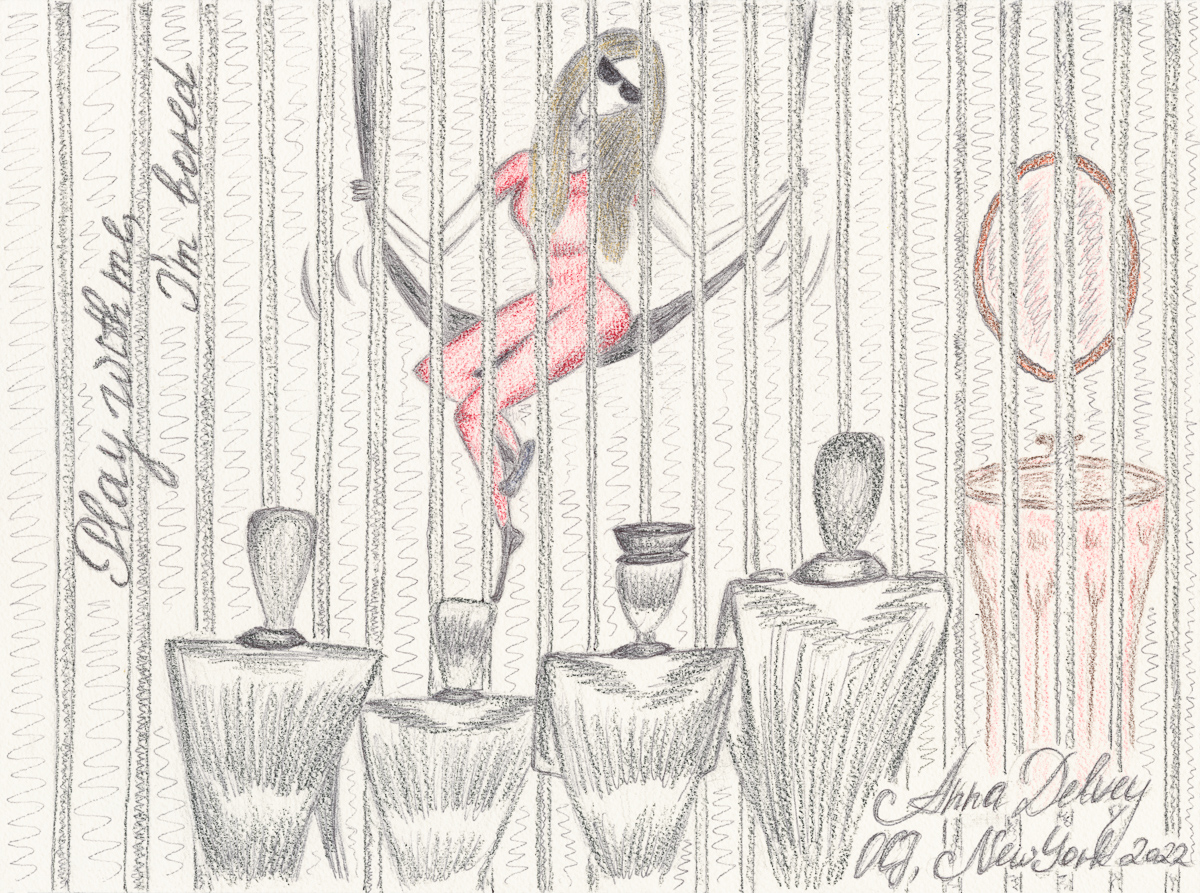
You probably have some opinions on prison reform. What do you think should be addressed or changed regarding the system?
I’m in this unique position. I have a voice, and so, hopefully, people will want to listen to what I have to say. I’ve been through the system myself, and you can’t just watch a documentary and understand this. There are just so many things that could be done better. I’ve never said, “Abolish prison.” There definitely should be prisons, they just should be better. If you take that step of depriving a person of their freedom, I feel the government should do something with it. For example, they put everybody in the same place, even though there’s a high gulf behind committing different crimes. Somebody killing their boyfriend is different from selling drugs, but everybody gets the same experience no matter what they’ve done. The time is different, but what you go through on a daily basis is the same – and it’s never addressed in prison or in jail. There’s no authority figure who comes to you and tries to unpack what led you to commit the crime. There are some generalized programs, but they are very general. You are never really being forced to do them.
And they have no program for financial crimes at all. In all the years I’ve been in jail, there was nobody who asked, “What even happened? What led to this sequence of events, and how can we make sure you don’t do the same thing again?” That never happened. Not a single time. When you go through parole and they ask you if you feel remorse, that’s pretty much it. You talk to them for 10 or 15 minutes after you’ve done your sentence, and that’s the only time anybody speaks with you. It should be different. But they can’t provide you with a counselor, which is something I’d like to see them try to do.
I read that because of the lack of programs, you ended up taking a cooking class. It’s just insane that that’s the therapy they offer.
Absolutely, and I only took the cooking class because I’d heard that the list was so long, so I thought I would never get picked. The whole social re-entry system should be so different. They do phase three, which is a month-long course where you’re approaching your release date and they help you look for a job. It involves looking through newspapers or job listings, and the VHS tapes they show you were clearly made in the eighties, and nothing has changed. If you look at the women being portrayed in those videos, there’s not that much of a difference from what they’re doing right now.
There’s so much missed opportunity because people feel prison is this magical solution, and the general population doesn’t think beyond prison. They think, “We’re gonna put this person in prison, and that’s gonna solve all the problems,” but unless you’re doing life, this person is coming back out eventually. When this person is back in the community, they will have to provide for themselves. I know so many people who’ve been convicted of nonviolent crimes and they don’t have a problem getting approved for a job, but then they run the background check a couple of weeks later, find out they have a felony charge, and they’re let go, even if it doesn’t matter for the job. The whole categorization of clients should be so different. Why is it only a misdemeanor or a felony? “Felony” means anything. If you steal something that’s worth over $1,000 in New York, that is a felony. If you kill 20 people, that’s a felony too. Words have power. There should be at least another mid-level term to remove some of the stigma. And they should create a job assistance program for when you are approaching your release date. Why wouldn’t the government have, for example, a contract with some big corporation like Amazon? Instead of showing people those VHS tapes, why can’t they send an online course to train people to pack boxes or whatever it may be, and you spend the last six months training for the job? Then, once you get out, you have something – as opposed to the way it is right now, where they tell you all these arbitrary things about how to look for a job, and then it becomes overwhelming when you’re released.
They have to make sure they have a home. People need to pay their bills and rent, which isn’t the case in prison. They’ve decided that you’re not going to make any phone calls, you’re not going to do anything, but you will still have your bed. You will still have your three meals a day, and nothing will happen to you. And this is just not real life. I could go on for hours about this.
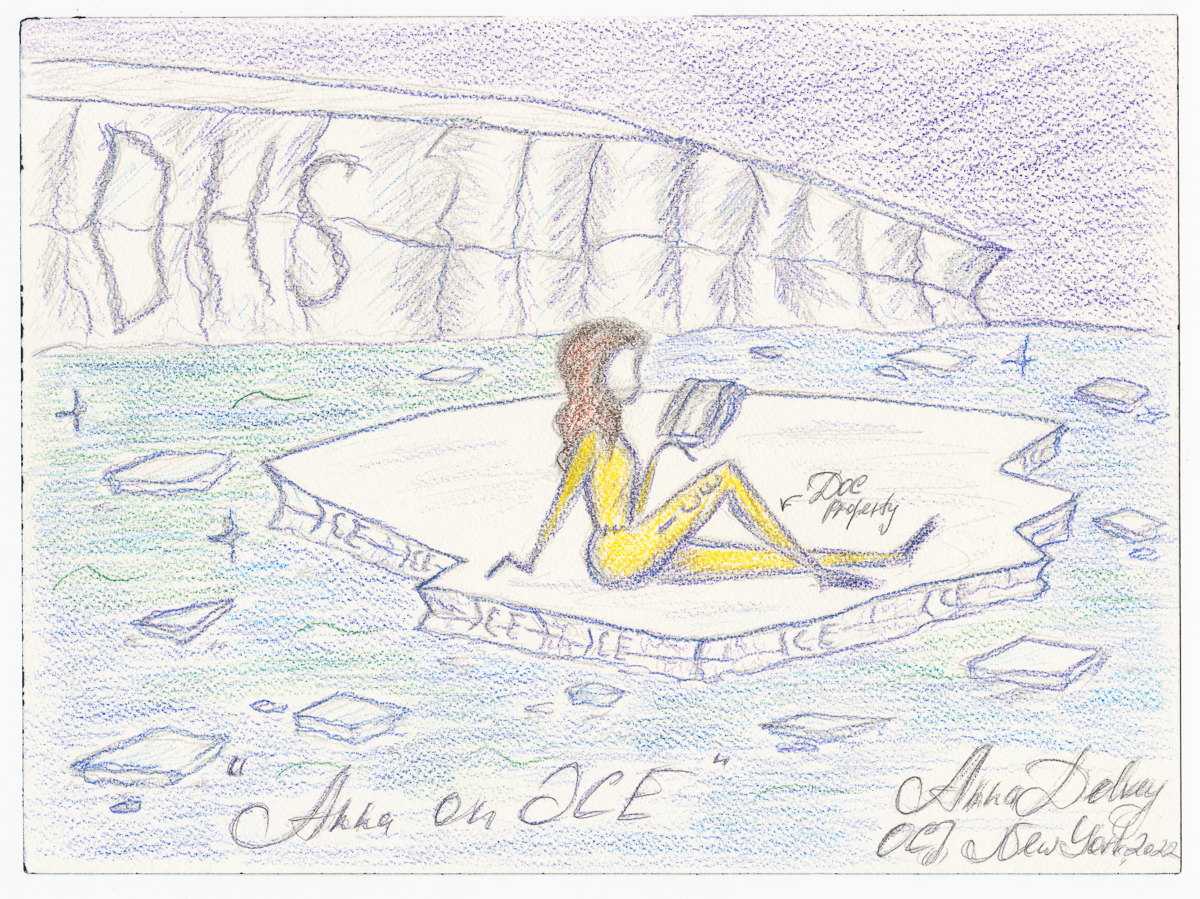
I understand that you were also helping fellow detainees with their cases?
I actually have ghostwritten many letters to judges and parole boards, and that’s a thing I feel they should have some kind of introduction to in law schools. So many people don’t even know the rules; they don’t even realize the consequences of what they’re doing. I don’t know if there’s any research, but I’m sure people are aware of the consequences of different crimes. I’m sure some people will be more hesitant to do something if you literally spell it out for them.
I went to trial, and there was this other girl who was going to court with me. They were selecting the jury, and she had a public defender, and she seemed so confused. She was on trial for stealing something from a grocery store. She said, “I don’t know what’s going on. My lawyer’s not telling me anything. Is it okay if I read a book?” And I’m like, “You should not be reading a book while your guys are selecting the jury. You need to seem engaged.” But that was a genuine question, and she was in her forties or late thirties. She really did not understand what was happening to her.
So many people just don’t realize it. They have public defenders who probably mean well, but they’re so overworked. It’s just not humanly possible for them to pay [that much] attention to a few cases. It’s a big machine. You just become a burden to everybody – to society, to the people around you – with all the costs that everybody has to carry. When you come to jail, whatever you’ve been doing, whatever you’ve been contributing financially, that’s now somebody else’s job. Even taking this phone call, somebody has to pay for it, and if you have nobody to pay for it, then you cannot talk to the person. It’s as simple as that. You can’t message the person if they can’t spend $10 or $20 every day to talk to you, but why should they pay? It’s not their fault you’re in jail. So I feel they should be given more responsibility. People who are incarcerated should be given more opportunities to fix things and to be more responsible for their own fate, as opposed to relying on the outside. There are too many people on the outside who are shamed into helping a relative in jail. It’s a good thing to do, and you’re not going to say no, but it’s also a burden to support somebody who is in jail.
You said that people don’t even understand the consequences of their actions that could lead to being convicted or going to jail. With your case, do you feel that you understood that you could go to jail for as long as you did?
Absolutely not. If anybody would bother to look at what I was trying to achieve, they could see that my intention was never to permanently defraud anybody. I didn’t want to take this money and run. I was asking for a loan, but that loan wouldn’t even go to me, it would go to a landlord, or it would be applied to the workers who would do their job, and then it would be paid from that amount. It was not like, “Anna is about to get $30 million,” like I was just going to spend it on myself. That was never even a possibility. I was never going to work that way, even if it were to happen. I thought nobody would bother to prosecute it because my intentions were never malicious.
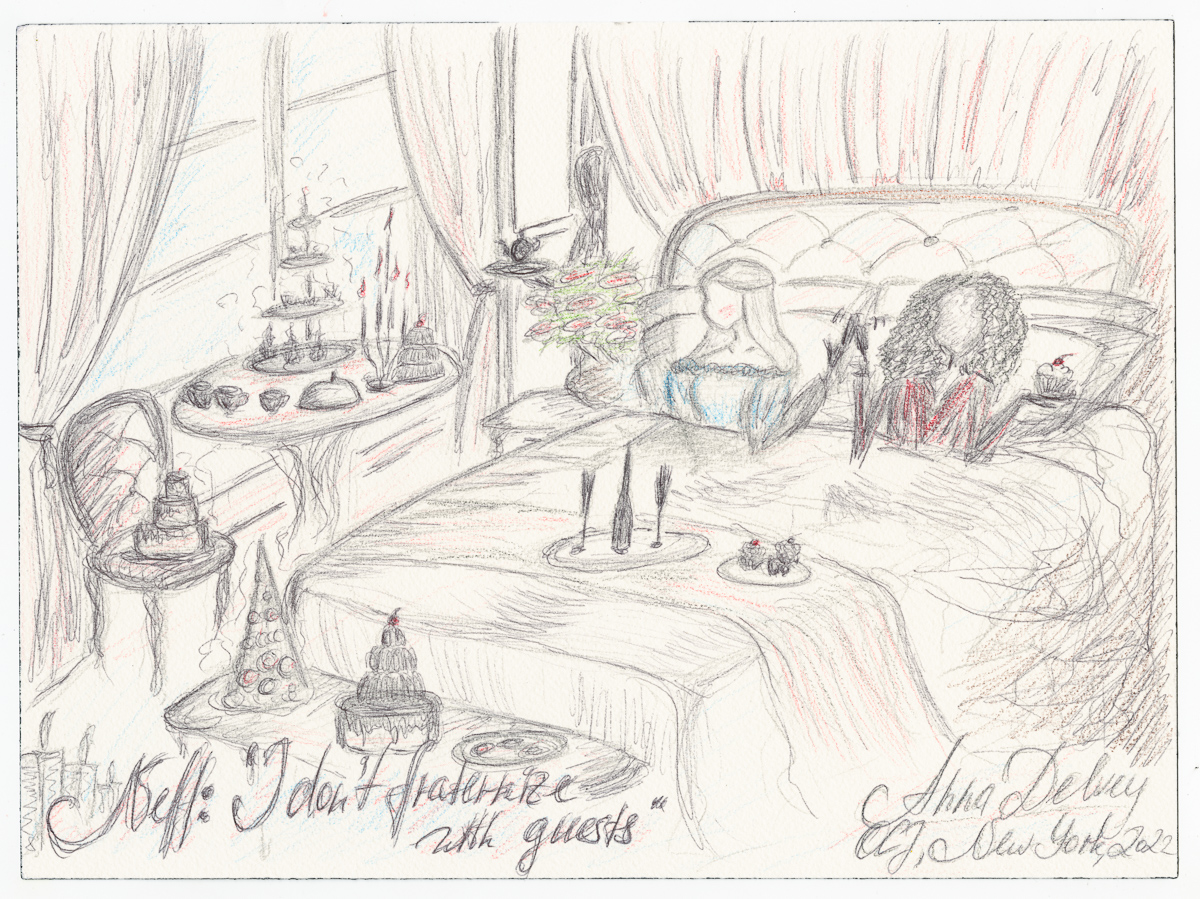
What about not paying the hotel bills? Did you think that wasn’t going to be taken seriously as a crime?
You mean the misdemeanors? Well, that was just one day that really happened kind of in the moment. That was nothing planned or premeditated. I paid 11 Howard, where I lived, but it’s a misconception that I didn’t.
Maybe that’s one of the things in the Netflix show that’s an exaggerated form of the truth?
I always had a way to make it work, and in the past, I did make things work. So there was every reason for me to believe that I would be able to figure things out moving forward, and it just didn’t happen that way.
So what are your plans after your release? I know that you have a documentary in the works, as well as a book and a podcast. Can you talk about some of these projects that you have coming up?
I’m actually working on my podcast right now. We’re figuring out some legalities. The documentary – I don’t know how much I can say about this, but I have so much going on. It’s more of a legal issue at this point. I’m very excited about that one. I always feel like, “Thank God I did not come out with the book two years ago or three years ago,” because the more I move through my current realities, it just gives me a better understanding of what happened and of what’s going on now. I feel the book that would’ve been written three years ago would be drastically different from what I have to say about the past now.
Looking back, is there anything you would’ve done differently?
Everybody asks me that question, and there are a lot of things I would’ve done differently, but this is just not the way life works. You don’t get the option to do anything differently. I tried to learn from my mistakes, fix them, and make something out of it. There’s no reason to sit and think about what I could have done differently because I just don’t have the option to do that. That’s not to say I’m living a life of regret. I don’t have any regrets. It’s just not the way I deal with the things that happen to me.
Which is why it’s fitting that your latest artwork is titled “No Regrets,” right?
That was ironic, yes. Everything happens for a reason, and I wouldn’t encourage anybody to do the same thing that I’ve done, but who knows what the alternative would’ve been? I don’t know what people want me to do – be a housewife, sell cookies, I don’t know. Maybe that would’ve been worse for me.
I saw that you’re friends with Julia Fox and that you recently did a podcast with her. We actually exhibited her artwork in several exhibits that I curated for The Untitled Space. Do you have any upcoming projects planned with Julia?
I’ve stayed in touch with Julia, and she’s definitely somebody I connect with. She gets it, and she was never judgmental. We’ve talked about different things, but everything depends on me getting out. I’m not trying to commit to anything and have people wait on me, but she’s definitely an interesting person, and I can totally see how she could relate to my story.
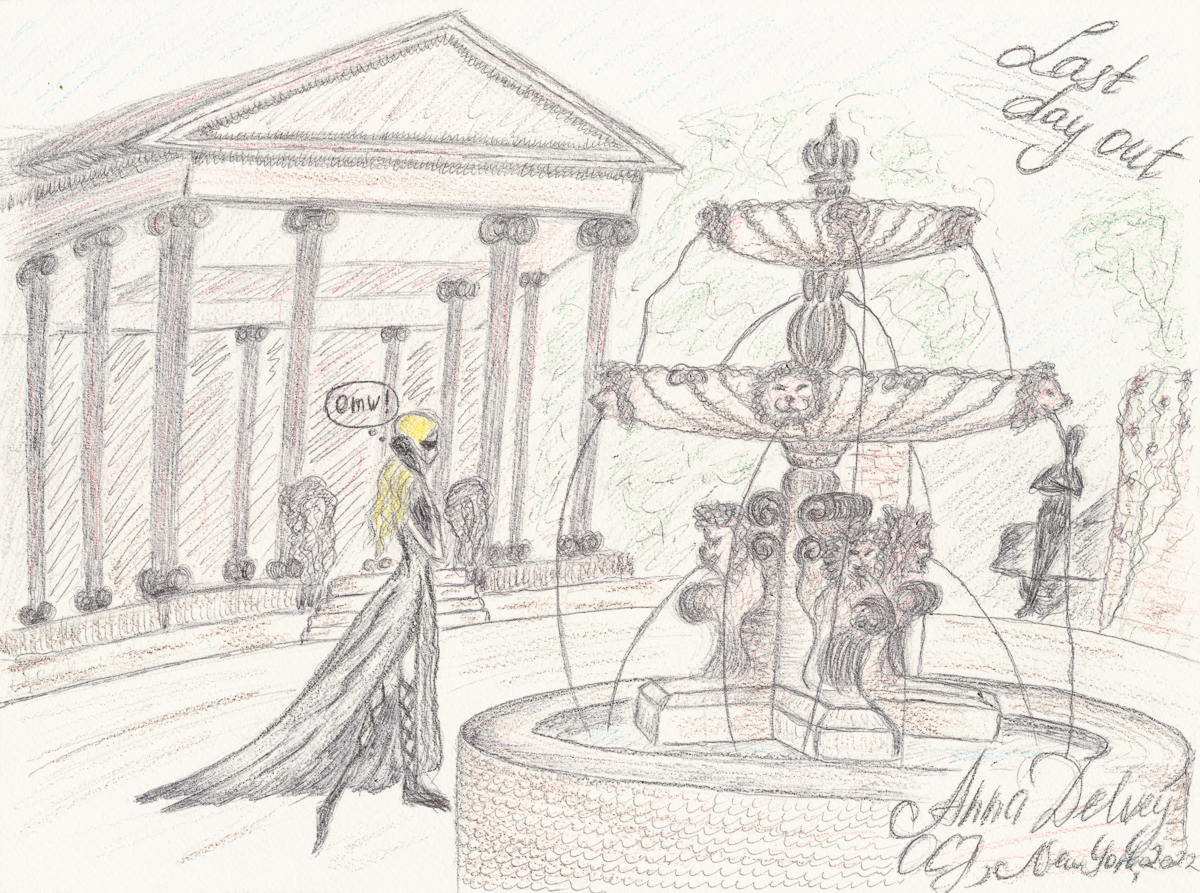
Do you have any news at all about when you might get released?
Well, I’m kinda scared to promise or say anything, but my case has reopened as of June of this year. I’m fighting with my credit council in court right now. They’re refusing to return my files to me. I got a new team who are great, and they are doing everything that can possibly be done to get me out. I’m always thinking I’m a week or two from getting free, but we’ll see. I will find out with very short notice. I’m trying to get a bond hearing, and when that happens, I’ll find out the same day. My main case is also moving forward.
What is the first thing you want to do when you get out?
Oh my god, so many things. Well, I’d love to get my phone back; it’s something to me about having control and staying connected to people. I can do so much if I have the right tools. And getting some new clothes.
So the new documentary that you’re working on, is it going be a reality type of show?
No reality shows for me. That’s absolutely a hard no. It’s just going to be something artsy.
This is our “REBEL Issue.” What does the word “rebel” mean to you?
I guess it’s not accepting or perpetuating the status quo or the role that I play, and trying to change the convention.
Anna Sorokin aka Anna Delvey interviewed by Indira Cesarine for The Untitled Magazine’s REBEL Issue. Pick up a copy in our online store or at newsstands in 30 countries.
View this post on Instagram


